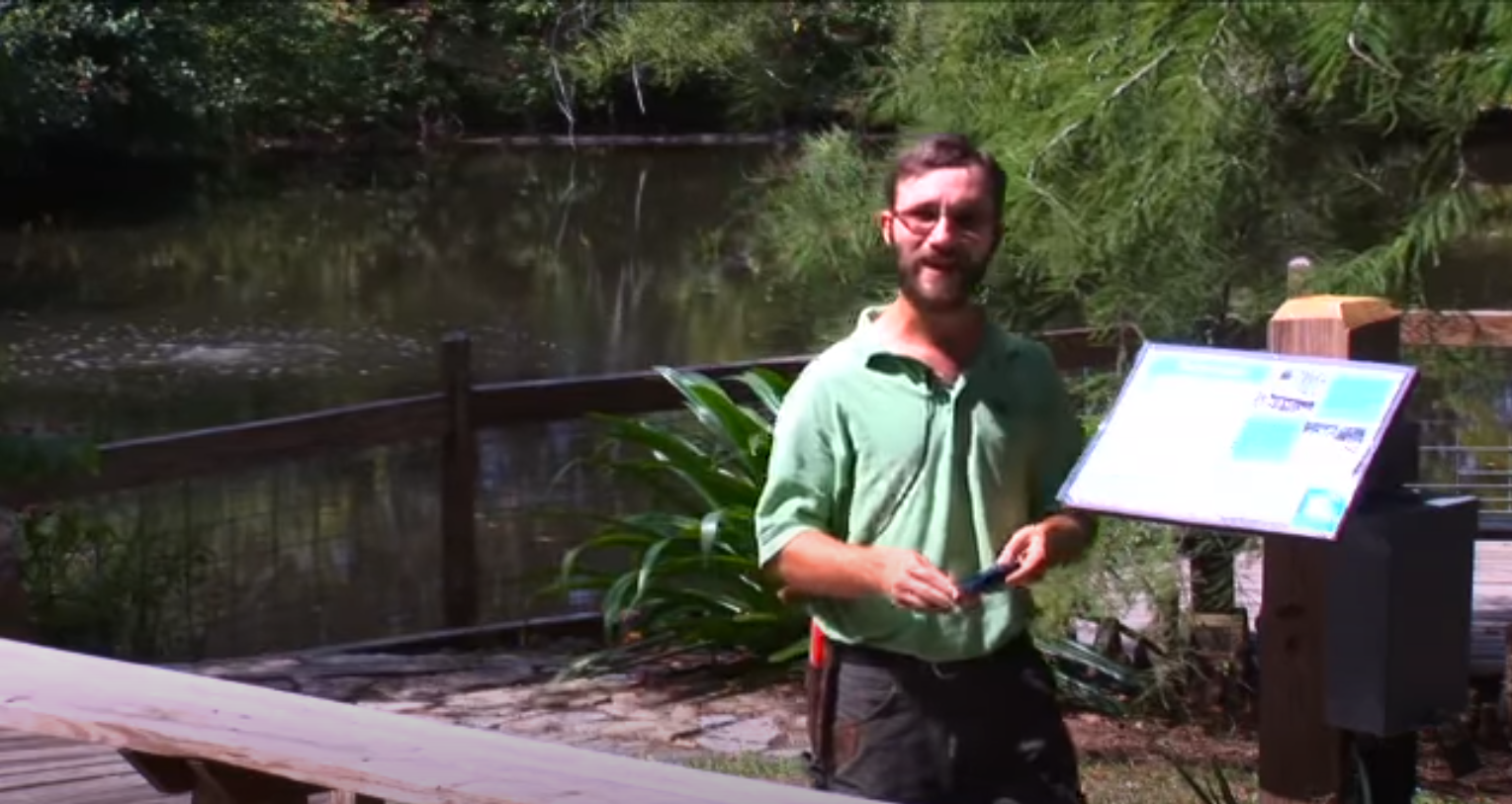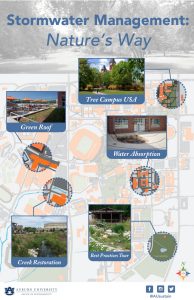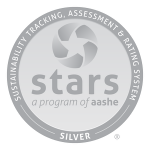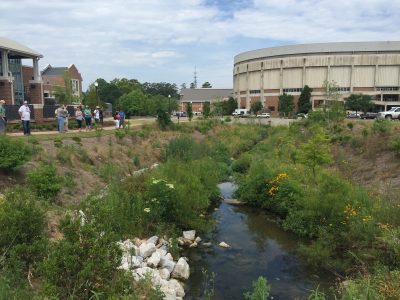Auburn University recognizes the benefits associated with maintaining the landscape in a sustainable way. We understand landscape planning, management, and natural biodiversity on campus reduces environmental impacts and promotes personal well-being on campus. For grounds at Auburn, our vision is to “provide a structure that will shape a beautiful, memorable and enduring pedestrian-oriented campus while integrating cultural and natural systems through constructed urban ecologies and restored and revitalized ecosystems (Landscape Master Plan).”
Grounds |
Practices
SPOTLIGHTS
Profile
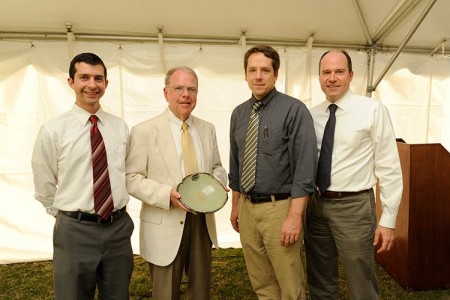
Tom Tillman (second from left) with members of the Auburn University Planning Department.
Tom Tillman served as the Director of University Planning for over 10 years in a career at Auburn that included over two decades of planning work. Tom has retired, but continues to be an active member of the Auburn family that has been a member of for more than 50 years. In his decades of work on campus, Tom has collaborated in the planning, design, construction, and renovation of many of the buildings that make up the physical “heart” of Auburn University. As a recipient who truly embodies the Auburn Spirit of Sustainability, we recognize his efforts, in particular, as the key driver in developing the Comprehensive Campus Master Plan.
The Comprehensive Campus Master Plan (CCMP) is one of the core documents that set the course for the future of the university, specifically focusing on the future goals and aspirations for the built environment, the connections for transportation and movement, and how both interact with the natural landscape that Auburn’s campus occupies.
Project
Thanks to the Donald E. Davis Arboretum for creating a tour to highlight the stormwater management features in the Arboretum. We hope you’ll take the tour, use the mobile web tour, and learn to use these simple methods to manage your own stormwater.
Points of Performance
Help us spread the facts on grounds management at Auburn by downloading and sharing our poster, and then spend some time learning the details about a few of the people and projects that help create our success.
2016 REPORT CARD
The grounds credits in AASHE STARS seeks to recognize institutions that plan and maintain their grounds with sustainability in mind. Campus grounds can be planned and maintained sustainably, minimizing the use of toxic chemicals, protecting wildlife habitat and conserving resources.
Below you can find out more about the specifics of Auburn’s performance in each of the credit areas, as well as how our efforts compare to those of other doctoral institutions who have also completed the STARS 2.0 assessment. *
OP-10: Landscape Management 0.19/2.00
This credit recognizes institutions that manage their grounds sustainably. Sustainable landscape management integrates economic, social, and ecological considerations to meet human needs and maintain healthy ecosystems.
OP-11: Biodiversity 1.00/1.00
This credit recognizes institutions that have a biodiversity management strategy designed to identify vulnerable ecosystems and species on campus and prevent, manage, and/or remediate damage to natural habitats and sensitive areas. Identifying and protecting the integrity of natural ecosystems can enhance the surrounding environment and improve the quality of campus and community life.
Collectively these efforts place us in the 2nd quartile, when compared to other doctoral institutions that have completed the STARS 2.0 assessment.

* Language adapted from the official STARS 2.0 Technical Manual.
2016 PRACTICES IN PLACE
At the time of the AASHE STARS submission, landscape management practices on campus included:
Adopt-A-Spot
Compost Pilot Project
Donald E. Davis Arboretum
Integrated Pest Management
Landscape Master Plan
Parkerson Mill Creek Restoration Plan
Smart Irrigation Controls
Stormwater Management Plan
KEY PARTNERS AND PLANS
The grounds successes of Auburn wouldn’t be possible without the foresight and determination of many units across campus and in the community. We hope you’ll choose to learn more about these important partners and the services and programs they offer the Auburn Family.
College of Agriculture — Department of Horticulture
Facilities Management — Campus Planning & Space Management
Facilities Management — Landscaping
The great work of these units is guided in part by Auburn’s Campus Master Plan and Landscape Master Plan.
GET INVOLVED
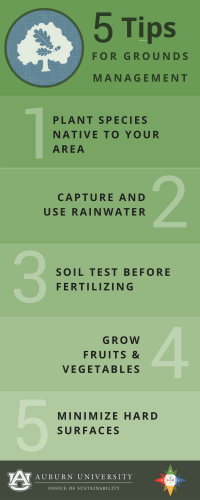 More sustainable practices in your own landscape can serve as a great start to making a difference, but you can also help improve our world by joining with others to work on these challenges at a larger scale. Consider connecting with one of the following groups or academic units to meet others interested in working on these issues, too.
More sustainable practices in your own landscape can serve as a great start to making a difference, but you can also help improve our world by joining with others to work on these challenges at a larger scale. Consider connecting with one of the following groups or academic units to meet others interested in working on these issues, too.
Organizations
American Society of Agricultural and Biological Engineers
American Society of Landscape Architects
Environmental Awareness Organization
Environmental Design Student Organization
Degree Options
Wildlife Ecology Management Degree
2016 STARS Report Score


